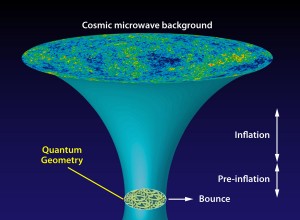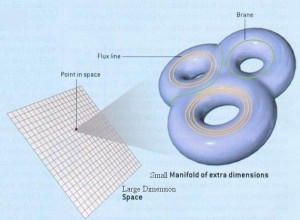It was mathematics, the non-empirical science par excellence, wherein the mind appears to play only with itself, that turned out to be the science of sciences, delivering the key to those laws of nature and the universe that are concealed by appearances. ~ Hannah Arendt!
The main appeal of the AdS/CFT duality is its holographic reconstructive interpretation of spacetime, and thus, by GR, of gravity, as emergent entropic phenomena: which is one way, and in my opinion, the best, of solving the problem of quantizing gravity. Since the duality is a mathematical isomorphism between a string theory on one space and a quantum field theory without gravity (defined) on the conformal boundary of that space, if one takes that space to be a Sasaki-Einstein manifold, coupled with the fact that all the ‘causal’ principles in physics are captured dynamically by QFT, a ‘Sasaki-Einstein’ AdS/CFT duality would constitute a total reductive elimination of spacetime and gravity. Why Sasaki-Einstein? Read-on. Let me start, and see where the mathematics leads us, and how that is related to gauge symmetry breaking, and why that is key. First, note that a Wigner-Weyl transformation guarantees that AdS has a boundary, and what is deep about the AdS/CFT duality is that the boundary has one less (could be more, depending on what model one is working with) dimension than the dimension of the space itself. We choose the half-space coordinatization in the corresponding super-Lagrangian manifold:
![]()
with ![]() the symplectic moment-map measure on AdS, and by a Fierz transformation
the symplectic moment-map measure on AdS, and by a Fierz transformation ![]() , we get:
, we get:
![]()
and has the Minkowski metric as the boundary at ![]() . This is the conformal boundary. We topologically deform CFT by certain fixed axionic and dilatonic source fields by adding the super-Kähler source:
. This is the conformal boundary. We topologically deform CFT by certain fixed axionic and dilatonic source fields by adding the super-Kähler source:
![]()
which is dual, in the metaplectic geometry of CFT, to AdS, with bulk field ![]() with boundary condition:
with boundary condition:
![]()
with ![]() the conformal dimension of the moment map operator
the conformal dimension of the moment map operator ![]() and
and ![]() is the number of covariant indices of
is the number of covariant indices of ![]() minus the contravariant ones: hence, the duality is expressed, generally, as:
minus the contravariant ones: hence, the duality is expressed, generally, as:
![Rendered by QuickLaTeX.com \[{\left\langle {\Im \left\{ {\exp \left( {\int {{d^{{d^ * }}}(x){J_{4D}}(x)\vartheta (x)} } \right)} \right\}} \right\rangle _{CFT}} = {\not Z_{AdS}}\left[ {\underbrace {{\rm{lim}}}_{Boundary}J{\omega ^{\Delta - J + k}} = {J_{4D}}} \right]\]](https://www.georgeshiber.com/wp-content/ql-cache/quicklatex.com-d449063b1abf95caf32c410ca1ba0615_l3.png)
with the left-hand side being the Gibbs vacuum expectation value of the time-symmetric and ordered operator over CFT, and the right-hand side is the quantum gravity inducing functional with the topologically given conformal boundary. In the Hilbert-space setting, the annihilation-creation operator will ‘create’ the graviton, but we need to equalize conformal supersymmetry in 4-D with CFT supersymmetry in 5-D, and then by solving the symplectic Seiberg-Witten equations, we can prove an exact match. However, to generate the graviton by breaking the gauge symmetry on the boundary, we must work with a 5-D Sasaki-Einstein manifold ![]() with supersymmetry group generators given by:
with supersymmetry group generators given by:
![]()
with ![]() the supersymmetry algebra vertices, and depending on whether + or -, we have:
the supersymmetry algebra vertices, and depending on whether + or -, we have:
![]()
with ![]() being the string variable on the corresponding 2-D worldsheet that generates the graviton via quantum fluctuation, and:
being the string variable on the corresponding 2-D worldsheet that generates the graviton via quantum fluctuation, and:
![]()
and thus we can go from the bosonic sector to the fermionic one and back, and ![]() being the matrix element of the unitary group. Now, in order to holomorphically eliminate 4-D gravity and ‘Hilbert-create’ the graviton on the CFT boundary, the background dual to CFT on a D3 brane in
being the matrix element of the unitary group. Now, in order to holomorphically eliminate 4-D gravity and ‘Hilbert-create’ the graviton on the CFT boundary, the background dual to CFT on a D3 brane in
![]()
must be cohomologically the base of a 6-D cone ![]() with metric:
with metric:
![]()
The geometry then is given by:
![]()
with:
![]()
and:
![]()
Exact holographic elimination requires that some vacua of CFT have gauge SuSy breaking, as demanded by Goldstone’s Theorem: thus, this gives us the full superpartner ‘particle’ spectrum. The method of such a breaking lies in factoring a Dp-brane worldvolume metric in the N=4 SuGra action. Therefore, we get a Darboux-Weinstein separation into p/4-parallel states, which is equivalent to an Orbifolding of CFT, where the 6-D cone ![]() is
is ![]() , with
, with ![]() the discrete group
the discrete group ![]() . Now let the elements of
. Now let the elements of ![]() be
be ![]() : then Dp, for p < 3, branes get topologically displaced arbitrarily far away, with arbitrary choice of measure, from the singularity of the conic Orbifold. The crucial metric is:
: then Dp, for p < 3, branes get topologically displaced arbitrarily far away, with arbitrary choice of measure, from the singularity of the conic Orbifold. The crucial metric is:
![]()
with ![]() the Green’s function and is:
the Green’s function and is:
![Rendered by QuickLaTeX.com \[H_6^{{\rm{fermion}}} = L_{{\Upsilon _6}}^4\sum\limits_{i = 1}^n {\frac{1}{{{{\left| {{\phi _{si}} - {\varpi _i}{\phi _{si}}} \right|}^4}}}} \not D{Q_{ - 1/2{\alpha ^i}}}d\,\Omega {\phi _{si}}\]](https://www.georgeshiber.com/wp-content/ql-cache/quicklatex.com-d7cb5dfb799c3635c37b117acc770bb0_l3.png)
and:
![Rendered by QuickLaTeX.com \[H_6^{{\rm{boson}}} = L_{{\Upsilon _6}}^4\sum\limits_j^n {\frac{1}{{{{\left| {{\phi _{si}} - {\varpi _j}{\phi _{si}}} \right|}^4}}}} \not D{Q_{1/2{\alpha _j}}}d\,\Omega ({\phi _{si}})\]](https://www.georgeshiber.com/wp-content/ql-cache/quicklatex.com-5f61d15d3b4300ab1316980b6f528d78_l3.png)
One then gets:
![]()
So far, so good, since the 6-D cone has a quintic Calabi-Yau metaplectic metric:
![]()
with:
![Rendered by QuickLaTeX.com \[d\,{\Omega ^M} = \frac{1}{9}{\left( {\not \partial \psi + \cos {\phi _{si}}{{\not \partial }_2}{\phi _{si}} + \cos \phi _{si}^2\not \partial \phi _{si}^2} \right)^2} + \frac{1}{6}\sum\limits_{i = 1}^i {\left( {\not \partial \phi _{si}^2 + {{\sin }^2}\phi _{si}^2} \right)} \]](https://www.georgeshiber.com/wp-content/ql-cache/quicklatex.com-3eff3c6fc29681c40d5bee53f3e57450_l3.png)
being the 6-D conic metric. We are now ready to exhibit SuSy gauge breaking by realizing that the space ![]() induces a Kähler relation between the masses of scalars ‘living’ in
induces a Kähler relation between the masses of scalars ‘living’ in ![]() , and the dimension operator of CFT
, and the dimension operator of CFT ![]() , given by:
, given by:
![Rendered by QuickLaTeX.com \[\begin{array}{c}\Delta _{{\rm{CFT}}}^D = \frac{1}{2}\int {{d^{Dp + 1}}} x\sqrt {{g_{\mu \nu }}} \left[ {{g_{\mu \nu }}{{\not \partial }_\mu }{\phi _{si}}{{\not \partial }_\nu }{\phi _{sj}} + {m^2}\phi _{si}^2} \right] = \\\frac{1}{2}\int {{d^4}} xdz{z^{ - Dp + 1}}\left[ {{{\left( {{{\not \partial }_z}{\phi _{si}}} \right)}^2} + {{\left( {{{\not \partial }_i}{\phi _{sj}}} \right)}^2} + \frac{{{m^2}}}{{{z^2}}}\phi _{si}^2} \right]\end{array}\]](https://www.georgeshiber.com/wp-content/ql-cache/quicklatex.com-90962632ad5bf5521b0e240133e1316b_l3.png)
with solution given by:
![]()
Such a Kähler relation allows us to derive the Euclidean ![]() massive scalar field via a Fierz transformational conic Dp+1 ‘braning’:
massive scalar field via a Fierz transformational conic Dp+1 ‘braning’:
![Rendered by QuickLaTeX.com \[{\delta ^F}\Delta _ \pm ^i = \left[ {\frac{{d{\phi _{si}}}}{2} + \sqrt {\frac{{{d^2}{\phi _{si}}}}{4}} {\phi _{si}}{{(m)}^2}} \right]_{Dp + 1}^{{\Upsilon _6}}\]](https://www.georgeshiber.com/wp-content/ql-cache/quicklatex.com-0f1a47de1b1eebb72d90d07e19175527_l3.png)
and a solution breaks SuSy group-theoretic gauge invariance. Thus, by Goldstone’s Theorem, the Sparticles whose fields ‘lie’ on the tangent bundle of:
![]()
have anti-Sparticles ‘living’ on the conformal boundary of ![]() divided by
divided by ![]() . Therefore, by holomorphic Yukawa reduction, one gets an exact 4-D Minkowskian holographic elimination of spacetime and gravity since General Relativity can be homologically embedded in
. Therefore, by holomorphic Yukawa reduction, one gets an exact 4-D Minkowskian holographic elimination of spacetime and gravity since General Relativity can be homologically embedded in ![]() . And, to answer why ‘Sasaki_Einstein’ – because the Sasaki-Einstein ‘AdS/CFT’ duality induces, both, a Minkowskian metric and a Ricci curvature tensor on:
. And, to answer why ‘Sasaki_Einstein’ – because the Sasaki-Einstein ‘AdS/CFT’ duality induces, both, a Minkowskian metric and a Ricci curvature tensor on:
![]()
we are ‘done’: voilà!



